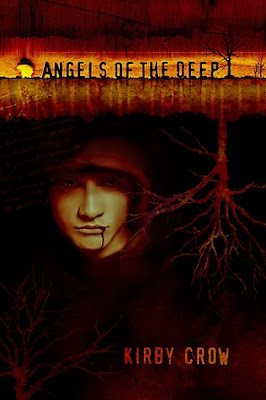Why two stars? I am torn about this book. Many of its merits turn against it, ending up as flaws. For example:
It has extraordinarily beautiful language. Kirby Crow spins pure magic with her words, making the reader see and feel everything as if they are present. However, the long descriptions slow the book down, to the point of halting action and becoming a chore. Much as I loved the details on decoration and the poetic description of landscapes, the atmosphere etc., from a point onwards I wanted things to happen and the story to move forward.
The atmosphere is stifling, foreboding, bleak. Crow captures the very essence of winter, heavy with hopelessness and despair. This continues relentlessly throughout the story to the point of becoming depressing and sometimes tiring. I often put the book down because I needed a break.
The protagonist, Becket, is miserable and beating himself for his failings and incomprehension of his place in the world. It’s very convincing and it makes you feel for him. You can taste his despair. Unfortunately, this happens for 240 out of 296 pages. So much angst and self-loathing desensitises the reader, and finally succeeds in making them bored and unsympathetic towards Becket. At least that was how I felt.
At one point, another hero thinks of who the protagonist really is and how the entire story has come to be. For almost five pages, we’re given all the details neatly wrapped in that person’s internal monologue. Yes, it is helpful, but I would prefer Crow to give the details through the story itself, rather than amassing so much info in such a straightforward way.
The romance between the two protagonists is a battle of wills that frustrated me more than stimulated me. Every time things were about to heat up, Becket stepped back, drowning in self-denial and shame and plain stubbornness. Moods and mannerisms changed from playful and skillfully seductive to aggressive and condescending in a matter of seconds. There isn’t always a realistic explanation or a smooth transition from intense flirting and absolute openness to anger, denial and irony. I would have preferred a more subtle and even approach. Then again, I didn’t write the book, so what I would have done is a matter of personal preference.
Crow has a very interesting and complex mythology as a background, but the way this mythology is presented is chaotic and often unconvincing, statements conflicting with actual happenings. We learn that Becket belongs to a race that care about themselves only. However, throughout the book Becket exhibits the exact opposite behaviour. I think Crow found the idea plausible as an angle, but didn’t present it in a convincing manner. The other members of the same race appear aloof and uncaring about everything, failing to ignite even a spark of interest in me. They were figures in the background. Even their imminent demise failed to stir any feeling. They felt two dimensional.
To sum up, it is an interesting but uneven read, with strong merits and equally strong flaws. If you enjoy long, dark, lyrical descriptions with an anguished, tortured protagonist, mystery and gore thrown in, you will love it. I struggled through it, loved some moments, hated others. I would suggest trying it out for yourself.



Leave a Reply